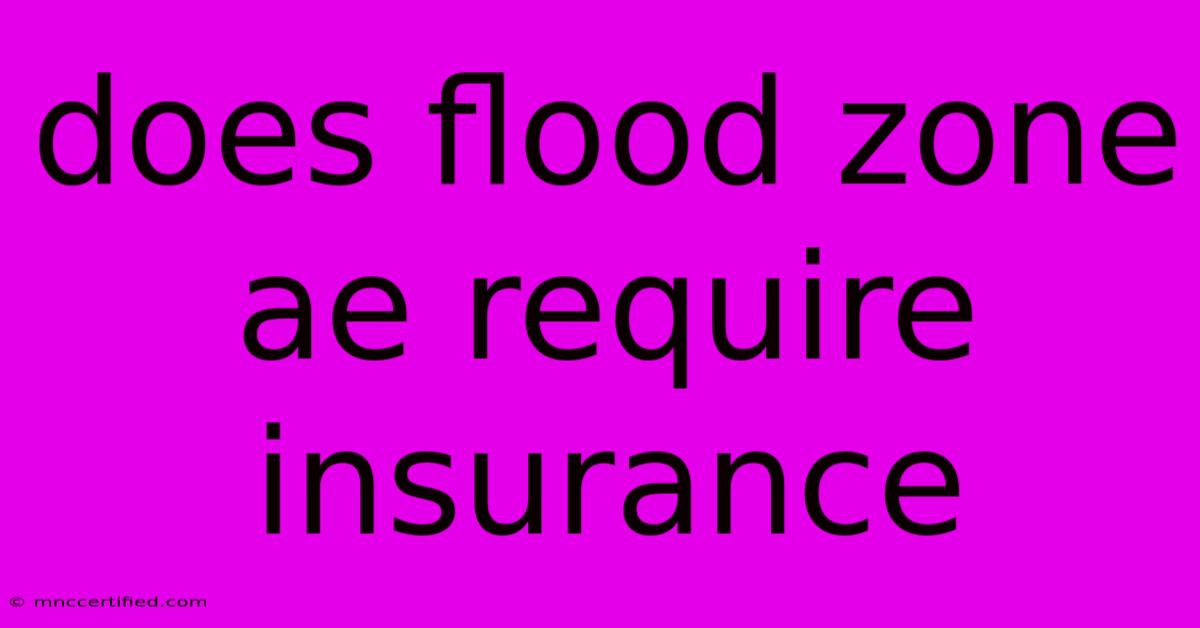Does Flood Zone Ae Require Insurance

Table of Contents
Does Flood Zone AE Require Insurance? Understanding Your Flood Risk and Insurance Requirements
If you're buying or selling a property in a flood zone, understanding the ins and outs of flood insurance is crucial. While the Federal Emergency Management Agency (FEMA) designates flood zones to identify areas at risk, the requirement for flood insurance depends on several factors. Here's a breakdown of what you need to know about flood zone AE and insurance.
What is Flood Zone AE?
Flood Zone AE signifies an Area of Special Flood Hazard, which means the area has a 1% chance of flooding in any given year. This zone is considered high-risk, and properties located in these zones are generally required to purchase flood insurance if they have a mortgage from a federally regulated lender.
Do You Need Flood Insurance in Flood Zone AE?
The answer is not always a simple yes or no. Here's a breakdown of the factors influencing the need for flood insurance in Flood Zone AE:
- Mortgage: If you have a federally backed mortgage, your lender will most likely require flood insurance for properties in Flood Zone AE. This is a common practice, as lenders are obligated to protect their investment.
- National Flood Insurance Program (NFIP): The NFIP provides flood insurance policies for properties in participating communities. Properties in Flood Zone AE are usually eligible for coverage under the NFIP.
- Property Type: Even though the requirement for flood insurance primarily applies to mortgaged properties, it's essential to consider your property type and its potential flood risk. For example, if you live in a Flood Zone AE with a basement or have a property that sits near a body of water, flood insurance is highly recommended, regardless of your mortgage status.
Understanding Flood Zone AE and Insurance
Flood Zone AE indicates a high flood risk, and therefore, flood insurance is strongly encouraged. While mandatory for mortgaged properties in this zone, you should consider it even if you don't have a mortgage.
Why is Flood Insurance Important?
Flood damage can be devastating and costly. Homeowners insurance typically doesn't cover flood damage, leaving you vulnerable to substantial financial losses. Flood insurance can help protect your property and assets in case of a flood event.
Where to Find Flood Insurance
- National Flood Insurance Program (NFIP): The NFIP is the primary source for flood insurance in the U.S. You can purchase an NFIP policy through a local insurance agent or broker.
- Private Insurance Providers: Some private insurers also offer flood insurance policies, especially for areas with lower flood risk.
Tips for Finding the Best Coverage
- Compare Quotes: Shop around for quotes from different insurers to find the best rate and coverage options.
- Understand Your Needs: Assess your property's flood risk and determine the appropriate coverage level.
- Ask Questions: Consult with an insurance agent or broker to discuss your specific situation and get expert advice.
Conclusion
Living in Flood Zone AE means you need to be aware of the risks and take necessary steps to protect yourself. Understanding the need for flood insurance and the factors influencing its requirement is crucial. While mandatory for mortgaged properties, purchasing flood insurance is a smart decision for any homeowner in a high-risk flood zone. By taking proactive steps, you can safeguard your home and finances against potential flood damage.

Thank you for visiting our website wich cover about Does Flood Zone Ae Require Insurance. We hope the information provided has been useful to you. Feel free to contact us if you have any questions or need further assistance. See you next time and dont miss to bookmark.
Featured Posts
-
How Much Is 4 99 Euros In Us Dollars
Nov 11, 2024
-
Snap In Dentures Cost With Insurance
Nov 11, 2024
-
Uk Ambassador Marks Armistice Day In Diego Suarez
Nov 11, 2024
-
Can Massage Therapist Bill Insurance
Nov 11, 2024
-
Edmund Fitzgerald 49 Years Since The Storm
Nov 11, 2024